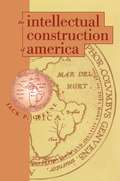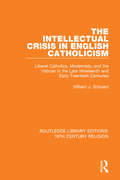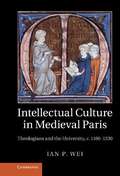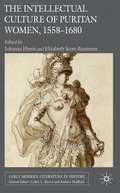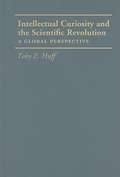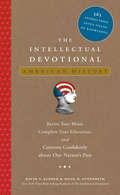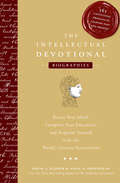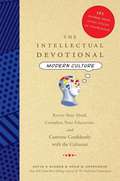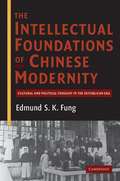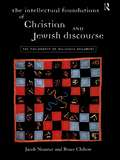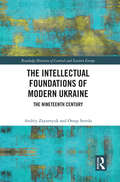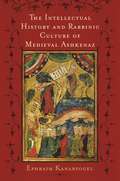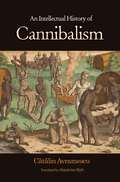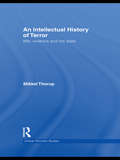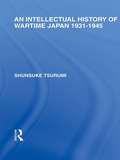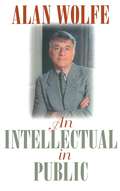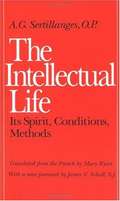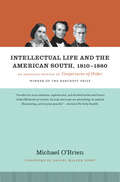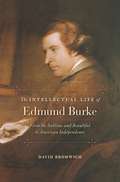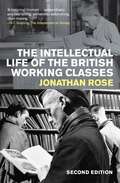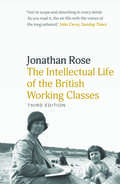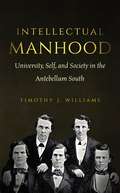- Table View
- List View
The Intellectual Construction of America
by Jack P. GreeneJack Greene explores the changing definitions of America from the time of Europe's first contact with the New World through the establishment of the American republic. Challenging historians who have argued that colonial American societies differed little from those of early modern Europe, he shows that virtually all contemporary observers emphasized the distinctiveness of the new worlds being created in America. Rarely considering the high costs paid by Amerindians and Africans in the construction of those worlds, they cited the British North American colonies as evidence that America was for free people a place of exceptional opportunities for individual betterment and was therefore fundamentally different from the Old World. Greene suggests that this concept of American societies as exceptional was a central component in their emerging identity. The success of the American Revolution helped subordinate Americans' long-standing sense of cultural inferiority to a more positive sense of collective self that sharpened and intensified the concept of American exceptionalism.
The Intellectual Crisis in English Catholicism: Liberal Catholics, Modernists, and the Vatican in the Late Nineteenth and Early Twentieth Centuries (Routledge Library Editions: 19th Century Religion #18)
by William J. SchoenlThis volume, first published in 1982, examines the attempts of English liberal Catholics to reconcile their Church with secular culture and provides an account of the development of liberal Catholicism in England in the late nineteenth and early twentieth centuries. This work was written not only for specialists in religious history but for all readers who might be interested in this seminal period of Catholicism. It is a study in religious, intellectual, and cultural history.
Intellectual Culture in Medieval Paris
by Ian P. WeiIn the thirteenth century, the University of Paris emerged as a complex community with a distinctive role in society. This book explores the relationship between contexts of learning and the ways of knowing developed within them, focusing on twelfth-century schools and monasteries, as well as the university. By investigating their views on money, marriage and sex, Ian Wei reveals the complexity of what theologians had to say about the world around them. He analyses the theologians' sense of responsibility to the rest of society and the means by which they tried to communicate and assert their authority. In the late thirteenth and early fourteenth centuries, however, their claims to authority were challenged by learned and intellectually sophisticated women and men who were active outside as well as inside the university and who used the vernacular – an important phenomenon in the development of the intellectual culture of medieval Europe.
The Intellectual Culture of Puritan Women, 1558–1680
by Johanna Harris Elizabeth Scott-BaumannThis collection of essays by leading scholars in the field reveals the major contribution of puritan women to the intellectual culture of the early modern period. It demonstrates that women's roles within puritan and broader communities encompassed translating and disseminating key texts, producing an impressive body of original writing.
Intellectual Curiosity and the Scientific Revolution
by Toby E. HuffSeventeenth-century Europe witnessed an extraordinary flowering of discoveries and innovations. This study, beginning with the Dutch-invented telescope of 1608, casts Galileo's discoveries into a global framework. Although the telescope was soon transmitted to China, Mughal India, and the Ottoman Empire, those civilizations did not respond as Europeans did to the new instrument. In Europe, there was an extraordinary burst of innovations in microscopy, human anatomy, optics, pneumatics, electrical studies, and the science of mechanics. Nearly all of those aided the emergence of Newton's revolutionary grand synthesis, which unified terrestrial and celestial physics under the law of universal gravitation. That achievement had immense implications for all aspects of modern science, technology, and economic development. The economic implications are set out in the concluding epilogue. All these unique developments suggest why the West experienced a singular scientific and economic ascendancy of at least four centuries.
The Intellectual Devotional: Revive Your Mind, Complete Your Education, and Converse Confidently about Our Na tion's Past (The Intellectual Devotional Series)
by David S. Kidder Noah D. OppenheimModeled after those bedside books of prayer and contemplation that millions turn to for daily spiritual guidance and growth, the national bestseller The Intellectual Devotional—offering secular wisdom and cerebral nourishment—drew a year's worth of readings from seven different fields of knowledge. <P><P>In The Intellectual Devotional: American History, authors David S. Kidder and Noah D. Oppenheim have turned to the rich legacy of American history for their selections. <P>From Thomas Jefferson and Benjamin Franklin to Martin Luther King Jr., from the Federalist Papers to Watergate, the giant figures, cultural touchstones, and pivotal events in our national heritage provide a bountiful source of reflection and education that will refresh knowledge, revitalize the mind, and open new horizons of intellectual discovery.
The Intellectual Devotional: Revive Your Mind, Complete Your Education, and Acquaint Yourself with the World' s Greatest Personalities (The Intellectual Devotional Series)
by Noah D. Oppenheim David S. KidderThe fifth installment of this bestselling series features 365 captivating entries about the most celebrated personalities in history. <P><P>Like its compulsively readable predecessors, The Intellectual Devotional: Biographies is organized into seven categories, one for each day of the week. With their trademark wit and style, authors David Kidder and Noah Oppenheim offer an array of fascinating facts about major figures from Atilla the Hun to Desmond Tutu. <P>In this daily devotional, learn about: <br>• authors and artists, from Homer and Ovid to Oscar Wilde and Virginia Woolf• leaders, such as Queen Elizabeth I, Abraham Lincoln, Susan B. Anthony, and Napoleon Bonaparte <br>• innovators, from Johannes Gutenberg to Isaac Newton to Werner Heisenberg• philosophers, including Socrates, Epicurus, Friedrich Nietzsche, and Jean-Paul Sartre <br>• rebels and reformers, from Joan of Arc and Spartacus to Galileo and Che Guevara <br>• preachers and prophets, including Lao-tzu, John the Baptist, Martin Luther, and Gandhi <br>• villains, such as Benedict Arnold, Genghis Khan, Ivan the Terrible, and Jack the Ripper <P>This volume shares the personal histories, accomplishments,and troubles of 365 people who have left an indelible mark on the world.
The Intellectual Devotional, Modern Culture: Revive Your Mind, Complete Your Education, and Converse Confidently with the Culturati
by David S. Kidder Noah D. OppenheimThe latest entry in The Intellectual Devotional series dives into the complex and vital world of Western culture, covering the essential artists, works, icons, and consumer products that have defined the way individuals live and express themselves.
The Intellectual Foundations of Chinese Modernity
by Edmund S. FungIn the early twentieth century, China was on the brink of change. Different ideologies - those of radicalism, conservatism, liberalism, and social democracy - were much debated in political and intellectual circles. Whereas previous works have analyzed these trends in isolation, Edmund S. K. Fung shows how they related to one another and how intellectuals in China engaged according to their cultural and political persuasions. The author argues that it is this interrelatedness and interplay between different schools of thought that are central to the understanding of Chinese modernity, for many of the debates that began in the Republican era still resonate in China today. The book charts the development of these ideologies and explores the work and influence of the intellectuals who were associated with them. In its challenge to previous scholarship and the breadth of its approach, the book makes a major contribution to the study of Chinese political philosophy and intellectual history.
The Intellectual Foundations of Christian and Jewish Discourse: The Philosophy of Religious Argument
by Bruce Chilton Jacob NeusnerThe Intellectual Foundations of Christian and Jewish Discourse argues that the Judaic and Christian heirs of Scripture adopted, and adapted to their own purposes and tasks, Greek philosophical modes of thought and argument. The authors explore how the earliest intellectuals of Christianity and Judaism shaped a tradition of articulated conflict and reasoned argument in the search for religious truth that was to be shared through continuing that argument with others.Neusner and Chilton examine, using the formative sources of Judaism and Christianity, the literary media of adaptation and reform: precisely where and how we identify in the foundation writings of Christianity and Rabbinic Judaism the new opposing modes of articulated conflict and reasoned argument that through Christianity and Judaism, Greek philosophy and science bequeathed to the West.
The Intellectual Foundations of Modern Ukraine: The Nineteenth Century (Routledge Histories of Central and Eastern Europe)
by Andriy Zayarnyuk Ostap SeredaThis is the first synthetic book-length study in English of the Ukrainian nation-building during the "long" nineteenth century. The narrative follows the evolution of the Ukrainian intellectuals and their ideas from the Age of Enlightenment at the end of the eighteenth century and to the era of Positivist science and social reform at the beginning of the twentieth century. The book focuses on the intellectuals, since in the case of Ukrainians—the nineteenth century epitome of stateless and overwhelmingly plebeian people—the intellectuals played a pivotal role in defining the Ukrainian national project. The central theme is intellectuals’ engagement not only with each other, but also with the people and land they represented. Views of Ukraine from the imperial and "world" capitals, larger intellectual currents, and geopolitical games are not neglected. Nevertheless, its main focus is on the Ukrainian intellectuals’ visions of Ukraine’s past, present and future, their responses to the challenges of modernity, their ideals, agendas, and programs. The Intellectual Foundations of Modern Ukraine is the ideal resource for upper-level undergraduates, postgraduates, and scholars interested in cultural anthorpology, political science, political philosophy, and the history of modern Ukraine.
The Intellectual History and Rabbinic Culture of Medieval Ashkenaz
by Ephraim KanarfogelIn The Intellectual History and Rabbinic Culture of Medieval Ashkenaz, author Ephraim Kanarfogel challenges the dominant perception that medieval Ashkenazic rabbinic scholarship was lacking in intellectualism or broad scholarly interests. While cultural interaction between Jews and Christians in western Europe was less than that of Sephardic Jews, Kanarfogel's study shows that the intellectual interests of Ashkenazic rabbinic figures were much broader than Talmudic studies alone. Kanarfogel begins by highlighting several factors that have contributed to relatively narrow perceptions of Ashkenazic rabbinic culture and argues that the Tosafists, and Ashkenazic rabbinic scholarship more generally, advocated a wide definition of the truths that could be discovered through Torah study. He explores differences in talmudic and halakhic studies between the Tosafist centers of northern France and Germany, delves into aspects of biblical interpretation in each region, and identifies important Tosafists and rabbinic figures. Kanarfogel also examines the composition of liturgical poetry (piyyut) by Tosafists, interest in forms of (white) magic and mysticism on the part of a number of northern French Tosafists, and a spectrum of views on the question of anthropomorphism and messianism. Overall, Kanarfogel demonstrates that the approach taken by Tosafists was broader, more open, and more multi-disciplinary than previously considered. Medieval and Jewish history scholars will appreciate Kanarfogel's volume, which is the culmination of several decades of research on the subject.
An Intellectual History of Cannibalism
by Cătălin AvramescuThe cannibal has played a surprisingly important role in the history of thought--perhaps the ultimate symbol of savagery and degradation-- haunting the Western imagination since before the Age of Discovery, when Europeans first encountered genuine cannibals and related horrible stories of shipwrecked travelers eating each other. An Intellectual History of Cannibalism is the first book to systematically examine the role of the cannibal in the arguments of philosophers, from the classical period to modern disputes about such wide-ranging issues as vegetarianism and the right to private property. Catalin Avramescu shows how the cannibal is, before anything else, a theoretical creature, one whose fate sheds light on the decline of theories of natural law, the emergence of modernity, and contemporary notions about good and evil. This provocative history of ideas traces the cannibal's appearance throughout Western thought, first as a creature springing from the menagerie of natural law, later as a diabolical retort to theological dogmas about the resurrection of the body, and finally to present-day social, ethical, and political debates in which the cannibal is viewed through the lens of anthropology or invoked in the service of moral relativism. Ultimately, An Intellectual History of Cannibalism is the story of the birth of modernity and of the philosophies of culture that arose in the wake of the Enlightenment. It is a book that lays bare the darker fears and impulses that course through the Western intellectual tradition.
An Intellectual History of Terror: War, Violence and the State (Routledge Critical Terrorism Studies)
by Mikkel ThorupThis book investigates terrorism and anti-terrorism as related and interacting phenomena, undertaking a simultaneous reading of terrorist and statist ideologists in order to reconstruct the 'deadly dialogue' between them. This work investigates an extensive array of violent phenomena and actors, trying to broaden the scope and ambition of the history of terrorism studies. It combines an extensive reading of state and terrorist discourse from various sources with theorizing of modernity's political, institutional and ideological development, forms of violence, and its guiding images of self and other, order and disorder. Chapters explore groups of actors (terrorists, pirates, partisans, anarchists, Islamists, neo-Nazis, revolutionaries, soldiers, politicians, scholars) as well as a broad empirical source material, and combine them into a narrative of how our ideas and concepts of state, terrorism, order, disorder, territory, violence and others came about and influence the struggle between the modern state and its challengers. The main focus is on how the state and its challengers have conceptualized and legitimated themselves, defended their existence and, most importantly, their violence. In doing so, the book situates terrorism and anti-terrorism within modernity's grander history of state, war, ideology and violence. This book will be of much interest to students of critical terrorism studies, political violence, sociology, philosophy, and Security Studies/IR in genera Mikkel Thorup is Assistant Professor at the Institute of Philosophy and the History of Ideas, University of Aarhus, Denmark.
An Intellectual History of Wartime Japan: 1931-1945 (Routledge Library Editions: Japan)
by Shunsuke TsurumiWhen this book was published in Japanese in 1982 it was awarded the prestigious Jiro Osaragi Prize. It is an important contribution to the understanding of the mental and spiritual world of Japan just over two generations ago. The author argues that just as the period of isolation up to the middle of the 19th century was crucial for Japan’s development, so the Second World War represented another crucial period for the country. These years were a period of intellectual isolation during which significant development took place.
The Intellectual in Modern Chinese History
by Timothy CheekThis vivid narrative history of Chinese intellectuals and public life provides a guide to making sense of China today. Timothy Cheek presents a map and a method for understanding the intellectual in the long twentieth century, from China's defeat in the Sino-Japanese war in 1895 to the 'Prosperous China' since the 2008 Beijing Olympics. Cheek surveys the changing terrain of intellectual life over this transformative century in Chinese history to enable readers to understand a particular figure, idea or debate. The map provides coordinates to track different times, different social worlds and key concepts. The historical method focuses on context and communities during six periods to make sense of ideas, institutions and individual thinkers across the century. Together they provide a memorable account of the scenes and protagonists, and arguments and ideas, of intellectuals and public life in modern China.
An Intellectual in Public
by Alan WolfeA new collection of essays from one of the most courageous and honest thinkers writing today "The question of the public intellectual is very much in the air again," writes Alan Wolfe. As one of our eminent social commentators, Wolfe should know; he's been writing, with fierce intellectual independence, about American public and private life since the 1960s. In this new collection of essays spanning seven years of contributions to The New Republic, The New Yorker, Atlantic Monthly, and other prominent publications, Wolfe displays the courage necessary to write honestly--yet free of ideology, cant, and piety--about the things Americans take very seriously. Wolfe thinks big; indeed, the essays in An Intellectual in Public confront many of the most controversial issues of our time: country, God, race, sex, material consumption, and left and right. Beginning and ending the book are original essays describing the public intellectual's role, and how Wolfe believes that role ought to be filled. An Intellectual in Public is not only a demonstration of Wolfe's pointed analytical skills but a testament to his belief that "severely ideological thinking" is inappropriate for some of our most difficult problems, and that "neither the right nor the left can speak for all of America. " Alan Wolfe is the director of the Boisi Center for Religion and American Public Life and also Professor of Political Science at Boston College. He is the author of over a dozen books, including One Nation After All: What Middle Class Americans Really Think About: God, Country, Family, Racism, Welfare, Immigration, Homosexuality, Work, the Right, the Left and Each Other.
The Intellectual Life: Its Spirit, Conditions, Methods
by A. G. Sertillanges Mary RyanThis is above all a practical book. It discusses with a wealth of illustration and insight such subjects as the organization of the intellectual worker's time, materials, and his life; the integration of knowledge and the relation of one's specialty to general knowledge; the choice and use of reading; the discipline of memory; the taking of notes, their classification and use; and the preparation and organization of the final production.
Intellectual Life and the American South, 1810-1860
by Michael O'BrienMichael O’Brien has masterfully abridged his award-winning two-volume intellectual history of the Old South,Conjectures of Order, depicting a culture that was simultaneously national, postcolonial, and imperial, influenced by European intellectual traditions, yet also deeply implicated in the making of the American mind. Here O’Brien succinctly and fluidly surveys the lives and works of many significant Southern intellectuals, including John C. Calhoun, Louisa McCord, James Henley Thornwell, and George Fitzhugh. Looking over the period, O'Brien identifies a movement from Enlightenment ideas of order to a Romanticism concerned with the ambivalences of personal and social identity, and finally, by the 1850s, to an early realist sensibility. He offers a new understanding of the South by describing a place neither monolithic nor out of touch, but conflicted, mobile, and ambitious to integrate modern intellectual developments into its tense and idiosyncratic social experience. Michael O’Brien has masterfully abridged his award-winning two-volume intellectual history of the Old South,Conjectures of Order, depicting a culture that was simultaneously national, postcolonial, and imperial, influenced by European intellectual traditions, yet also deeply implicated in the making of the American mind. Here O’Brien succinctly and fluidly surveys the lives and works of many significant Southern intellectuals, including John C. Calhoun, Louisa McCord, James Henley Thornwell, and George Fitzhugh. Looking over the period, O'Brien identifies a movement from Enlightenment ideas of order to a Romanticism concerned with the ambivalences of personal and social identity, and finally, by the 1850s, to an early realist sensibility. He offers a new understanding of the South by describing a place neither monolithic nor out of touch, but conflicted, mobile, and ambitious to integrate modern intellectual developments into its tense and idiosyncratic social experience.
The Intellectual Life of Colonial New England
by Samuel Eliot MorisonDescribes the thought of New England's scholars during the period.
The Intellectual Life of Edmund Burke: From The Sublime And Beautiful To American Independence
by David BromwichThis intellectual biography examines the first three decades of Burke's professional life. His protest against the cruelties of English society and his criticism of all unchecked power laid the groundwork for his later attacks on abuses of government in India, Ireland, and France.
The Intellectual Life of the British Working Classes
by Jonathan RoseWhich books did the British working classes read--and how did they read them? How did they respond to canonical authors, penny dreadfuls, classical music, school stories, Shakespeare, Marx, Hollywood movies, imperialist propaganda, the Bible, the BBC, the Bloomsbury Group? What was the quality of their classroom education? How did they educate themselves? What was their level of cultural literacy: how much did they know about politics, science, history, philosophy, poetry, and sexuality? Who were the proletarian intellectuals, and why did they pursue the life of the mind?These intriguing questions, which until recently historians considered unanswerable, are addressed in this book. Using innovative research techniques and a vast range of unexpected sources, The Intellectual Life of the British Working Classes tracks the rise and decline of the British autodidact from the pre-industrial era to the twentieth century. It offers a new method for cultural historians--an "audience history" that recovers the responses of readers, students, theatergoers, filmgoers, and radio listeners. Jonathan Rose provides an intellectual history of people who were not expected to think for themselves, told from their perspective. He draws on workers' memoirs, oral history, social surveys, opinion polls, school records, library registers, and newspapers. Through its novel and challenging approach to literary history, the book gains access to politics, ideology, popular culture, and social relationships across two centuries of British working-class experience.
The Intellectual Life of the British Working Classes
by Jonathan RoseThis is a landmark intellectual history of Britain&’s working classes from the preindustrial era to the twentieth century. Drawing on workers&’ memoirs, social surveys, library registers, and more, Jonathan Rose uncovers which books people read, how they educated themselves, and what they knew. A new preface addresses the continuing relevance of the book amidst the upheavals of the present day. &“An astonishing book.&”—Ian Sansom, The Guardian &“A passionate work of history. . . . Rose has written a work of staggering ambition.&”—Daniel Akst, Wall Street Journal Winner of the SHARP Book History Prize, the American Philosophical Society&’s Jacques Barzun Prize, and the British Council Prize cowinner of the Longman-History Today Book of the Year Prize for 2001; named one of the finest books of 2001 by The Economist.
Intellectual Manhood
by Timothy J. WilliamsIn this in-depth and detailed history, Timothy J. Williams reveals that antebellum southern higher education did more than train future secessionists and proslavery ideologues. It also fostered a growing world of intellectualism flexible enough to marry the era's middle-class value system to the honor-bound worldview of the southern gentry. By focusing on the students' perspective and drawing from a rich trove of their letters, diaries, essays, speeches, and memoirs, Williams narrates the under examined story of education and manhood at the University of North Carolina, the nation's first public university.Every aspect of student life is considered, from the formal classroom and the vibrant curriculum of private literary societies to students' personal relationships with each other, their families, young women, and college slaves. In each of these areas, Williams sheds new light on the cultural and intellectual history of young southern men, and in the process dispels commonly held misunderstandings of southern history. Williams's fresh perspective reveals that students of this era produced a distinctly southern form of intellectual masculinity and maturity that laid the foundation for the formulation of the post-Civil War South.
Intellectual Networks in Timurid Iran: Sharaf al-Dīn ʿAlī Yazdī and the Islamicate Republic of Letters (Cambridge Studies in Islamic Civilization)
by İlker Evrim BinbaşBy focusing on the works and intellectual network of the Timurid historian Sharaf al Dīn ʿAlī Yazdī (d. 1454), this book presents a holistic view of intellectual life in fifteenth-century Iran. İlker Evrim Binbaş argues that the intellectuals in this period developed informal networks which transcended political and linguistic boundaries, and spanned an area from the western fringes of the Ottoman state to bustling late medieval metropolises such as Cairo, Shiraz, and Samarkand. Among many others, the network included an Ottoman revolutionary, a Mamluk prophet, a Timurid occultist, as well as physicians, astronomers, devotees of the secret sciences, and those political figures who believed that the network was a force to be taken seriously. Also discussing the formation of an early modern Islamicate republic of letters, this book offers fresh insights into the study of intellectual history beyond the limitations imposed by nationalist methodologies, established genres, and recognized literary traditions.
